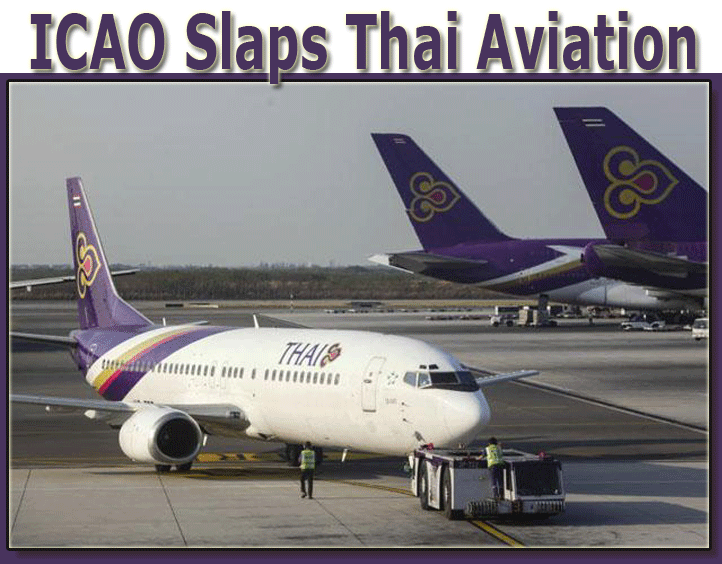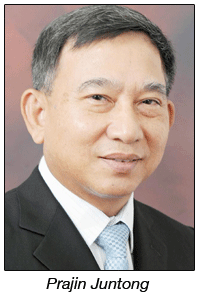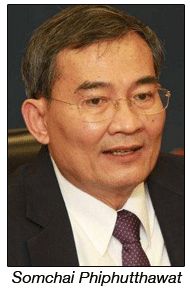
The
International Civil Aviation Organization (ICAO) downgraded the Thai Department
of Civil Aviation (DCA) to Category 1 effective June 18th, after a Universal
Safety Oversight Audit Program (USOAP) audit red flagged a number of safety
concerns in January.
The shortcomings were addressed with DCA
after compliance deadlines were set by ICAO, which apparently were not
met by DCA.
DCA operates the 28 domestic airports in
Thailand and also provides regulatory oversight over the entire Thai aviation
industry; this dual role of the DCA as airport operator and regulator
ICAO is considered a possible conflict of interest.
The ICAO Audit discovered that at some Thai
LCCs certain basic ICAO requirements had not been met: Mandatory manuals
were not on hand; licensing of staff was not in order, and there was a
shortage of qualified aviation inspectors as well as serious deficiencies
in the enforcement of the regulations pertaining to the transport of dangerous
goods/hazardous materials by air.
A safety plan submitted by the Thai DCA
intended to ward off the downgrade was rejected by ICAO in March 2015.
ICAO concerns center on low-cost carriers
operating in Thailand.
While ICAO does not have any powers of enforcement,
downgrading to Category 1 usually prompts US FAA IASA (International Aviation
Safety Assessments) audits for those airlines who operate services to
or through the U.S.
Likewise, the European Aviation Safety Agency
EASA would put a Cat. 1 country under scrutiny and, depending on the outcome
of investigations, might ban airlines registered from a Cat. 1 country
from operating in and out of the EC altogether.
“The downgrade could create a ripple
effect and prompt global aviation agencies to reevaluate the safety of
Thai aviation facilities,” said the Economic Intelligence Center
of Thailand's Siam Commercial Bank in a press release.
Kasikornbank’s market analyst Nattariya
Wittayatanaseth echoed: "This could dampen the prospects for the
tourism sector, which has been the only bright spot for Thailand's economy
so far." The Tourism Council of Thailand
(TCT) simply called the impact of the ICAO downgrade “colossal.”
Elsewhere, Japan and South Korea took immediate
measures in March 2015 by suspending Thai-registered aircraft from operating
charter flights and new routes.
“Thai Airways (TG) had just suspended
its all-cargo operations with its two existing 747-400BCFs, citing ‘lack
of demand,’ but outlined that those aircraft would be put to charter
and ad-hoc work.
“The route and fleet plans of TG and
other carriers are now in shambles,” a source told FlyingTypers.
Thai Switcheroo

 Thai
Minister for Transport Prajin Juntong put DCA boss Somchai Phiphutthawat
on the sidelines in all of this, ordering the beleaguered Somchai to trade
jobs with Thailand Inspector-General Parichart Khotcharat. Thai
Minister for Transport Prajin Juntong put DCA boss Somchai Phiphutthawat
on the sidelines in all of this, ordering the beleaguered Somchai to trade
jobs with Thailand Inspector-General Parichart Khotcharat.
Whether this measure will speed up the fixing
of the shortcomings in the Thai aviation system remains to be seen.
Minister Juntong explained that “the
change is for the sake of suitability” while Ms. Parichart commented
that “she did not know in advance about the transfer but that she
is prepared to do her best in the job,” reported the Bangkok Post.
So far, TG has been able to minimize the
impact of the ICAO downgrade by utilizing outside, ICAO-endorsed inspection
procedures in order to avoid its aircraft being subjected to restrictions
in foreign airspace.
“Thai Airways has had to rely on other
states’ civil aviation authorities to provide oversight for where
Thai Airways operates,” TG said in a subsequent press release.
Jens
|





